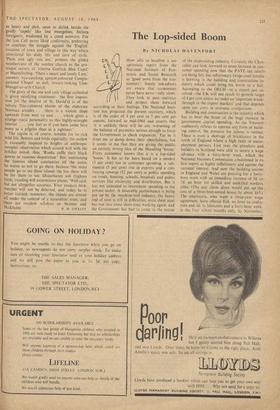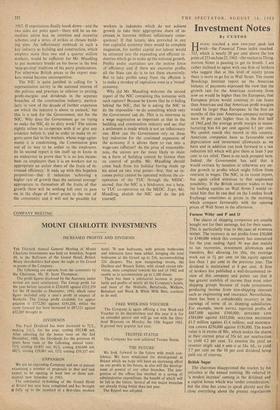The Lop-sided Boom
By NICHOLAS DAVENPORT
How silly to headline a too optimistic report from the National Institute of Eco- nomic and Social Research as 'good news from the eco- nomists'! Surely sub-editors are aware that economists never have news—only views. They look at past statistics and project them forward according to their feelings. The National Insti- tute has projected the present recovery, which is of the 'order of 4 per cent to 5 per cent per annum, forward to mid-1964 and asserts that 'it is unlikely there will be any worsening of the balance of payments serious enough to force the Government to cheek expansion.' Far be it from me to damp down their cheerfulness, but it seems to me that they are giving the public an entirely wrong idea of the Maudling 'boom.' Every economist knows that it is a lop-sided 'boom.' It has so far been based on a modest (3 per cent) rise in consumer spending, a sub- stantial (5 per Cent) rise in exports and a con- tinuing upsurge (12 per cent) in public spending on roads, housing. schools, hospitals and public services like electricity and distribution. But it has not extended to investment spending in the private sector. A miserable performance is being put up by the machine-tool industry, the heavy end of steel is still in difficulties; even sheet steel has run into some short-time working again, and the Government has had to come to the rescue of the shipbuilding industry. Certainly the Chan- cellor can look forward to some increase in con- sumer spending now that the PAYE tax reliefs arc being felt, but inflationary (wage-cost) trouble is brewing in the building and construction in- dustry which could bring his boom to a halt. According to the OECD—in a report just re- ceived—the UK will not reach its growth target of 4 per cent unless we make an 'important break- through in the export markets' and that depends upon our costs in overseas competition.
Building and construction is the industry which has to bear the brunt of the huge increase in government capital spending. As the Treasury. stubbornly refuses to operate any form of build- ing control, the pressure for labour is intense. There is even a shortage of bricklayers in the north of England where a high ratio of unem- ployment persists. Last year the plumbers and builders in Scotland were able to secure a wage advance with a forty-hour week, which the National Incomes Commission condemned in its first report as highly inflationary and against the national interest. And now the building unions in England and Wales are pressing for a forty- hour week with an immediate increase of 5d. to 7d. an hour for skilled and unskilled workers ([he pay claim alone would put up the cost of a three-bedroomed house by about /65.) The employers, who want a three-year wage agreement. have offered 84-d. an hour to crafts- men and 4d. to labourers and a forty-hour weCk, in the four ‘s inter months only, by November, 1965; If negotiations finally break down—and the two sides are poles apart—there will be an im- mediate union ban on overtime and incentive schemes and a series of strikes at chosen build- ing sites. An inflationary outbreak in such a key industry as building and construction, which employs more than one and a quarter million workers, would be sufficient for Mr. Maudling to put monetary breaks on his boom in the best 'stop-go-stop' tradition of his party predecessors. For otherwise British prices in the export mar- kets would become uncompetitive.
The NIC is quite justified in calling for 'a -representative survey in the national interest of the policies and practices in relation to pricing, profit-margins and dividends in the separate branches of the construction industry, particu- larly in view of the decade of further expansion on which the industry is about to embark,' but this is a task for the Government, not for the NIC. Why does the Government go on trying • to make the'NIC do its dirty work? The unions rightly refuse to co-operate with it or give any evidence before it, and in order to make its re- ports seem fair to the workers, whose wage agree- ments it is condemning, the Commission goes out of its way to be unfair to the employers. In its second report it ties itself up in knots in an endeavour to prove that 'it is no less incum- bent on employers than it is on workers not to appropriate an unfair share of the fruits of in- creased efficiency.' It ends up with this hopeless proposition—that if industries 'achieving a higher rate of growth than the national average' appropriate to themselves all the fruits of that growth there will be nothing left over to pass on in the shape of lower prices to the rest of the community and it will not be possible for workers in industries which do not achieve growth to take their appropriate share of in- creases in incomes without inflationary conse- quences! If that lunatic idea prevailed in any free capitalist economy there would be complete stagnation, for neither capital nor labour would be attracted into the expanding and efficient in- dustries which go to make up the national growth. Profits under capitalism are the motive force of efficiency and if there are excessive profits all the State can do is to tax them excessively. But to take profits away, from the efficient is to make a monkey of capitalism even in a 'mixed' economy.
Why did Mr. Maudling welcome the second report of the NEC containing this nonsense with such rapture? Because he knows that he is hiding behind the NIC, that he is asking the NIC to do the impossible—to do something which only the Government cat' do. This is to intervene in a wage negotiation as important as that in the building and construction industry and see that a settlement is made which is not an inflationary one. How can the Government rely on these key industries for the continued expansion of the economy if it allows them to run into a wage-cost inflation? As the price of reasonable- ness, the unions are far more likely to insist on a form of building control by licence than on control of profits. Mr. Maudling should come back from his holiday having made up his mind on two vital points—first, that an in- comes policy cannot be operated without the co- operation of the TUC through the NEDC; second, that the NEC is a hindrance, not a help, to TUC co-operation on the NEDC. Ergo, Mr. Maudling, abolish the NIC and do the job yourself.































 Previous page
Previous page